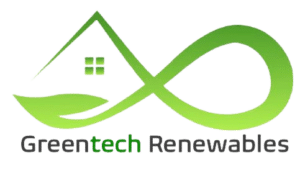Investing in solar panels in the UK is still worthwhile, considering the improvements in technology and various financial incentives. Upfront costs generally range from £4,000 to £8,000, but government programs can greatly offset these expenses. You could see annual savings between £200 to £300, with a payback period of 5 to 10 years. Additionally, solar energy reduces carbon emissions and promotes energy security. As technology advances, the attractiveness of solar panels may continue to grow. There’s more to explore on this topic.
Table of Contents
ToggleCurrent State of Solar Energy in the UK
As the demand for renewable energy sources continues to rise, the current state of solar energy in the UK reflects both significant advancements and ongoing challenges. Over the past decade, solar capacity has increased dramatically, with millions of installations across homes and businesses. This growth has contributed to a more sustainable energy mix, helping to reduce carbon emissions. However, challenges remain, including intermittent energy generation and the need for enhanced storage solutions. Additionally, public perception can fluctuate based on initial costs and long-term benefits. While technological innovations have improved efficiency, the UK must continue investing in infrastructure and education to maximize solar energy’s potential. Understanding these dynamics is essential for anyone considering solar energy as a viable option. Modern solar panels can generate 355W per panel when operating at peak efficiency in strong sunlight conditions.
Financial Incentives and Government Support
What financial incentives and government support are available for solar panel installations in the UK today? Currently, various programs can greatly reduce your initial investment. The Smart Export Guarantee (SEG) allows you to earn money for the excess energy you generate and export back to the grid. Additionally, some local councils offer grants or financial assistance for solar installations.
| Incentive Type | Description | Potential Benefit |
|---|---|---|
| Smart Export Guarantee | Sell excess energy back to the grid | Regular income stream |
| Local Grants | Financial aid from councils | Reduced installation costs |
| Tax Relief | Savings on VAT for solar products | Lower upfront expenditure |
These incentives can enhance the overall appeal of solar energy in the UK.
Cost-Benefit Analysis of Solar Panel Installation
When evaluating the cost-benefit analysis of solar panel installation, it’s essential to take into account both the initial investment and the long-term savings. The upfront cost can be significant, typically ranging from £4,000 to £8,000 for a standard system. However, you’ll likely notice reduced energy bills, with savings averaging around £200 to £300 annually. Over time, these savings can offset the initial expenditure, often resulting in a payback period of 5 to 10 years, depending on energy prices and system efficiency. Additionally, government incentives may further enhance your financial return. Ultimately, considering factors such as energy usage, local sunlight exposure, and potential increases in property value will help you make a more informed decision about solar panel installation.
Environmental Impact of Solar Energy
Solar energy considerably reduces greenhouse gas emissions, making it an essential component in combating climate change. By harnessing sunlight, you’re utilizing a renewable resource that doesn’t produce harmful pollutants. This shift away from fossil fuels leads to cleaner air and a healthier environment. Here are some key environmental impacts of solar energy:
- Decreased carbon footprint, markedly lowering CO2 emissions.
- Reduction in air and water pollution associated with traditional energy sources.
- Preservation of natural habitats by minimizing land disruption.
- Sustainable energy production, reducing reliance on finite resources.
- Enhanced energy security through diversified energy sources.
Future Trends in Solar Technology and Energy Prices
As advancements in technology continue to reshape the energy landscape, you’ll see significant innovations in solar energy systems that promise to enhance efficiency and affordability. Emerging trends include the development of bifacial solar panels, which capture sunlight from both sides, increasing energy generation. Additionally, advances in energy storage technologies, such as lithium-ion and solid-state batteries, are set to improve how solar energy is stored and used, increasing reliability. Energy prices are also likely to fluctuate due to global market dynamics and government policies promoting renewable energy. As these trends progress, investing in solar panels may become increasingly attractive, offering long-term savings and contributing to a more sustainable energy future. Staying informed can help you make the best decisions for your energy needs.
Frequently Asked Questions
How Long Does It Take to Install Solar Panels?
Installing solar panels typically takes one to three days, depending on your system size and complexity. You’ll need to prepare your roof, schedule inspections, and guarantee all permits are in order before installation begins.
What Maintenance Do Solar Panels Require?
Think of solar panels as silent sentinels, quietly soaking up the sun. You’ll need to clean them occasionally, check for debris, and monitor performance, but they generally require minimal maintenance to keep shining bright.
Can I Install Solar Panels on a Flat Roof?
Yes, you can install solar panels on a flat roof. Just guarantee proper drainage and consider using tilt mounts for ideal sunlight exposure. Consulting a professional can help maximize efficiency and guarantee a successful installation.
Do Solar Panels Work on Cloudy Days?
Oh sure, solar panels just love the sunshine, don’t they? But don’t worry! They still generate electricity on cloudy days, just at a reduced capacity. You’ll still benefit, even when the sky’s not blue!
What Happens if My Solar Panels Produce Excess Energy?
If your solar panels produce excess energy, you can sell it back to the grid or store it in batteries for later use. This not only maximizes your energy efficiency but can also save you money.



